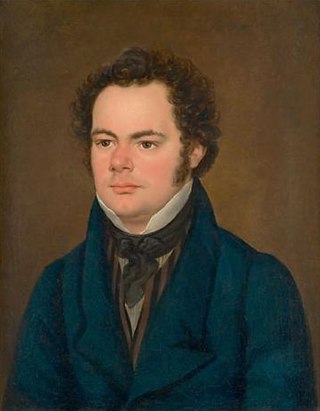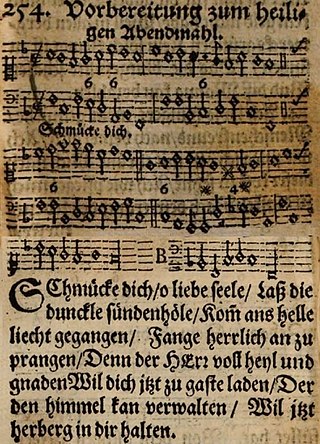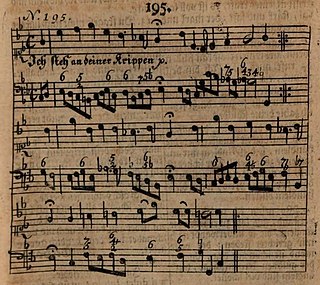| Unter dem Rauschen deiner Wimpern | |
|---|---|
| Directed by | Gerhard Klein |
Release date |
|
| Country | East Germany |
| Language | German |
Unter dem Rauschen deiner Wimpern is an East German film. It was released in 1951.
The Deutsche Singmesse is a form of (Tridentine) Low Mass that developed in German-speaking countries.

Unheilig is a German band that draws from a variety of influences, including various pop and electronic styles as well as heavier, nihilistic hard rock. The band was founded in Aachen in 1999 and principally consisted of singer Bernd Heinrich "Der Graf" along with various musical partners. He was accompanied for live shows with musicians Christoph "Licky" Termühlen, Henning Verlage, and Martin "Potti" Potthoff. The group's debut, Phosphor, came out in 2000.
"Schließe mir die Augen beide" is a poem by Theodor Storm from his 1851 collection Sommergeschichten und Lieder. It was twice set to music by Alban Berg. Berg composed his first setting in 1907, dedicating it to his future wife, Helene Nahowski. The second version was composed in 1925 to celebrate the 25th anniversary of the Universal Edition music publisher. This second setting was Berg's first full-fledged 12 tone composition, and he re-used its tone row, or rather its secondary set, in the first movement of the Lyric Suite for string quartet of 1926.

Hans Weingartner is an author, director and producer of films. Born in Feldkirch, Vorarlberg, he attended the Austrian Association of Cinematography in Vienna and earned a diploma as a camera assistant. Later, he studied film at the Academy of Media Arts KHM in Cologne, Germany. He also has studied neuroscience at the University of Vienna and graduated from the neurosurgical department at the Free University of Berlin’s Steglitz Clinic.

"An deiner Seite (Ich bin da)" (English: By Your Side (I'm here)) is the third single from the album Zimmer 483 from band Tokio Hotel. The song's translated version By Your Side was released simultaneously in non-German-speaking countries with exactly the same video. "By Your Side" is included in the band's album Scream.
In the Shadow of Your Wings is a collection of selected entries from the diary of Jochen Klepper covering the period between April 1932 and 10 December 1942. The book appeared in 1956.

"Unter Deiner Flagge" is the third single from Unheilig's album Grosse Freiheit. Like the previous two singles, it was released as a two-track single and a limited edition disc with a poster included.

Best Of TH is the first compilation album by German rock band Tokio Hotel, it was released on December 13, 2010 in Germany, and December 14, 2010 internationally.

Hänssler-Verlag is a German music publishing house founded in 1919 as Musikverlag Hänssler by Friedrich Hänssler Senior to publish church music. The company is now based in Holzgerlingen. Since 1972 Hänssler Verlag has also published contemporary and jazz music.
Der letzte Zeuge is a German crime television series set in Berlin. Created by Gregor Edelmann, it aired on ZDF from 1998 to 2007 and was mostly directed by Bernhard Stephan. It stars Ulrich Mühe as medical examiner Dr Robert Kolmaar, along with Gesine Cukrowski as his colleague Dr Judith Sommer and Jörg Gudzuhn as police officer Johannes "Joe" Hoffer.

Johann Sebastian Bach composed the church cantata Wohl dem, der sich auf seinen Gott, BWV 139, in Leipzig for the 23rd Sunday after Trinity and first performed it on 12 November 1724. The chorale cantata is based on the hymn by Johann Christoph Rube (1692).

Frei.Wild is a German rock band from Brixen, South Tyrol, Italy. Its members belong to the German-speaking population of South Tyrol and their songs are mostly in German.

"Geh aus, mein Herz, und suche Freud" is a summer hymn with a text in German by theologian Paul Gerhardt written in 1653. It was first published that same year in the fifth edition of Johann Crüger's hymnal Praxis pietatis melica. It was sung to several melodies, the most popular one composed by August Harder, and later became a Volkslied in an abridged version.

Franz Schubert's best known song cycles, like Die schöne Müllerin and Winterreise are based on separate poems with a common theme and narrative. Other song cycles are based on consecutive excerpts of the same literary work: Schubert's "Ave Maria" is part of such a song cycle based on excerpts of the same poem, in this case by Walter Scott.

Gerhard Zwerenz was a German writer and politician. From 1994 until 1998 he was a member of the Bundestag for the Party of Democratic Socialism (PDS).
"Straf mich nicht in deinem Zorn" is a Lutheran hymn with a text written by Johann Georg Albinus as a paraphrase of Psalm 6. It was first printed with a formerly secular melody in Dresden in 1694. The song was included in 31 hymnals. The melody inspired musical settings both for organ and vocal works. The hymn was translated by Catherine Winkworth as "Not in anger, Mighty God", which appeared in 13 hymnals.

"Schmücke dich, o liebe Seele" is a Lutheran hymn in German, with lyrics by Johann Franck and a hymn tune by Johann Crüger. It was first published in Crüger's 1649 Geistliche Kirchen-Melodien, and was later adopted in other hymnals, such as the 1653 edition of his Praxis pietatis melica.

"Ich steh an deiner Krippen hier" is a German Christmas hymn, with lyrics by Paul Gerhardt which were first published in 1653. It was then sung with an older melody by Martin Luther, but a melody which was likely created by Johann Sebastian Bach for Schemellis Gesangbuch of 1736 is now part of current Protestant and Catholic hymnals.

Deutsches Hochamt is the title common to several mass compositions by Michael Haydn, setting the mass ordinary in German by Franz Seraph von Kohlbrenner. Three of the works require trained singers and orchestra, while a fourth is kept simple to be sung by the congregation as a Deutsche Singmesse (Betsingmesse). His best-known German High Mass is catalogued as MH 560. Haydn's masses in German are also known by the incipit of the first of ten songs, "Hier liegt vor deiner Majestät".

The Responsories by the German composer Max Reger are 20 short settings of mostly biblical texts in English, to be used as responsories in Lutheran church services. Composed in 1911, they were first published in Philadelphia in 1914 as The Responsories.